CC Madhya 4.186: Difference between revisions
No edit summary |
(Vanibot #0054 edit - transform synonyms into clickable links, which search similar occurrences) |
||
| Line 17: | Line 17: | ||
<div class="synonyms"> | <div class="synonyms"> | ||
''pragāḍha'' | ''[//vanipedia.org/wiki/Special:VaniSearch?s=pragāḍha&tab=syno_o&ds=1 pragāḍha]'' — intense; ''[//vanipedia.org/wiki/Special:VaniSearch?s=premera&tab=syno_o&ds=1 premera]'' — of love of Godhead; ''[//vanipedia.org/wiki/Special:VaniSearch?s=ei&tab=syno_o&ds=1 ei]'' — this; ''[//vanipedia.org/wiki/Special:VaniSearch?s=svabhāva&tab=syno_o&ds=1 svabhāva]'' — natural; ''[//vanipedia.org/wiki/Special:VaniSearch?s=ācāra&tab=syno_o&ds=1 ācāra]'' — behavior; ''[//vanipedia.org/wiki/Special:VaniSearch?s=nija&tab=syno_o&ds=1 nija]'' — personal; ''[//vanipedia.org/wiki/Special:VaniSearch?s=duḥkha&tab=syno_o&ds=1 duḥkha]'' — inconvenience; ''[//vanipedia.org/wiki/Special:VaniSearch?s=vighna&tab=syno_o&ds=1 vighna]'' — impediments; ''[//vanipedia.org/wiki/Special:VaniSearch?s=ādira&tab=syno_o&ds=1 ādira]'' — and so on; ''[//vanipedia.org/wiki/Special:VaniSearch?s=nā&tab=syno_o&ds=1 nā]'' — not; ''[//vanipedia.org/wiki/Special:VaniSearch?s=kare&tab=syno_o&ds=1 kare]'' — does; ''[//vanipedia.org/wiki/Special:VaniSearch?s=vicāra&tab=syno_o&ds=1 vicāra]'' — consideration. | ||
</div> | </div> | ||
Latest revision as of 23:29, 19 February 2024

A.C. Bhaktivedanta Swami Prabhupada
TEXT 186
- pragāḍha-premera ei svabhāva-ācāra
- nija-duḥkha-vighnādira nā kare vicāra
SYNONYMS
pragāḍha — intense; premera — of love of Godhead; ei — this; svabhāva — natural; ācāra — behavior; nija — personal; duḥkha — inconvenience; vighna — impediments; ādira — and so on; nā — not; kare — does; vicāra — consideration.
TRANSLATION
“This is the natural result of intense love of Godhead. The devotee does not consider personal inconveniences or impediments. In all circumstances he wants to serve the Supreme Personality of Godhead.
PURPORT
It is natural for those who have developed intense love for Kṛṣṇa not to care for personal inconvenience and impediments. Such devotees are simply determined to execute the order of the Supreme Personality of Godhead or His representative, the spiritual master. In all circumstances, even amidst the greatest dangers, they undeviatingly carry on with the greatest determination. This definitely proves the intense love of the servitor. As stated in Śrīmad-Bhāgavatam (SB 10.14.8), tat te ’nukampāṁ su-samīkṣamāṇaḥ: those who seriously desire to get free from the clutches of material existence, who have developed intense love for Kṛṣṇa, are worthy candidates for going back home, back to Godhead. An intense lover of Kṛṣṇa does not care for any number of material discomforts, scarcity, impediments or unhappiness. It is said that when one sees apparent unhappiness or distress in a perfect Vaiṣṇava, it is not at all unhappiness for him; rather, it is transcendental bliss. In the Śikṣāṣṭaka (8), Śrī Caitanya Mahāprabhu has also instructed, āśliṣya vā pāda-ratāṁ pinaṣṭu mām (CC Antya 20.47). The intense lover of Kṛṣṇa is never deviated from his service, despite all difficulties and impediments brought before him.